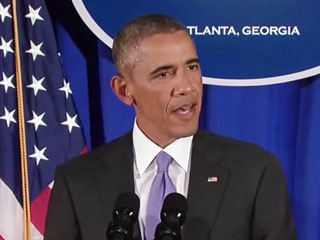President Obama Speaks at CDC on the Ebola Outbreak
September 16, 2014
The problem:

In West Africa, Ebola is now an epidemic of the likes that we have not seen before. It is getting worse. It's spreading faster and exponentially. Today, thousands of people in West Africa are infected. That number could rapidly grow to tens of thousands. And if the outbreak is not stopped now, we could be looking at hundreds of thousands of people infected, with profound political and economic and security implications for all of us.
U.S. action:
That's why, two months ago, I directed my team to make this a national security priority. We're working this across our entire government, which is why today I'm joined by leaders throughout my administration, including from my national security team.
We've devoted significant resources in support of our strategy with four goals in mind.
- To control the outbreak.
- To address the ripple effects of local economies and communities to prevent a truly massive humanitarian disaster.
- To coordinate a broader global response.
- To urgently build up a public health system in these countries for the future - not just in West Africa but in countries that don't have a lot of resources generally.
Today, I'm announcing a major increase in our response.
- At the request of the Liberian government, we're going to establish a military command center in Liberia to support civilian efforts across the region - similar to our response after the Haiti earthquake. It's going to be commanded by Major General Darryl Williams, commander of our Army forces in Africa.
- We're going to create an air bridge to get health workers and medical supplies into West Africa faster. We're going to establish a staging area in Senegal to help distribute personnel and aid on the ground more quickly.
- We are going to create a new training site to train thousands of health workers so they can effectively and safely care for more patients. Personnel from the U.S. Public Health Service will deploy to the new field hospitals that we're setting up in Liberia.
- USAID will join with international partners and local communities in a Community Care Campaign to distribute supplies and information kits to hundreds of thousands of families so they can better protect themselves.
- We're also going to build additional treatment units, including new isolation spaces and more than 1,000 beds.
- Meanwhile, our scientists continue their urgent research in the hope of finding new treatments and perhaps vaccines. And today I'm calling on Congress to approve the funding that we've requested so that we can carry on with all these critical efforts.
International action:
- But this is a global threat, and it demands a truly global response. International organizations have to move faster than they have up until this point.
- More nations need to contribute experienced personnel, supplies, and funding that's needed, and they need to deliver on what they pledge quickly.
- Charities and individual philanthropists have given generously, and they can make a big difference.
- We also need NGOs and private philanthropies to work with us in a coordinated fashion in order to maximize the impact of our response.
The reality is that this epidemic is going to get worse before it gets better. But right now, the world still has an opportunity to save countless lives. Right now, the world has the responsibility to act - to step up, and to do more.
